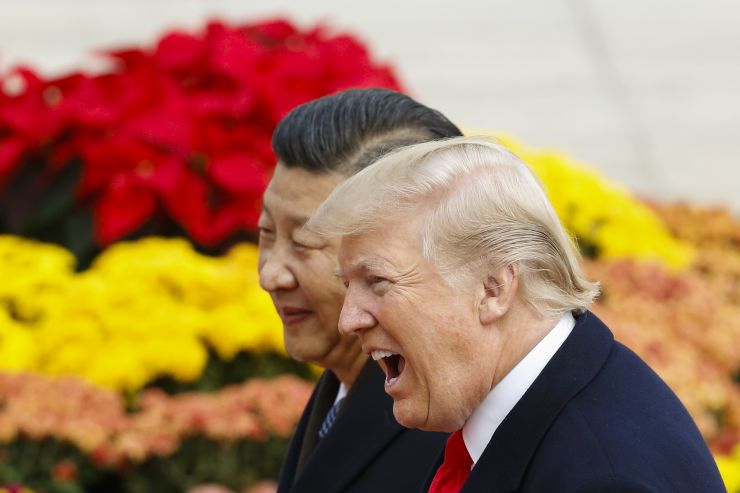
Stocks pulled back on Wednesday as trade worries increased while declines in Qualcomm and retailer shares also dampened market sentiment.
The Dow Jones Industrial Average fell 100.72 points to 25,776.61 as Apple lagged. The S&P 500 slipped 0.3% to 2,856.27, with the tech sector sliding 0.6%. The Nasdaq Composite declined by 0.5% to 7,750.84.
“A few weeks ago, it looked like a trade deal was imminent. The market was about 3% higher than it is now. I would think that if we got a resolution, we’d go back to around those levels,” said Ed Keon, chief investment strategist at QMA. “On the other hand, if we do go into a full-blown trade war … then I suspect it would be a much bigger event for the market.”
“If the downside is much more than the upside, and you don’t have a way of assessing the odds of the downside scenario happening, the prudent thing to do is to pull back to a more neutral position,” Keon said.
Treasury Secretary Steven Mnuchin told CNBC’s Ylan Mui that a trip to Beijing to retake trade negotiations has not been scheduled yet. This lowered hope of a speedy resolution to the U.S.-China trade war. Adding to the negative sentiment, President Donald Trump said he would not work with Democrats on an infrastructure bill if they kept investigating him.
Restrictions on Chinese telecom giant Huawei have led China to rethink its entire economic relationship with the U.S., according to a report from The South China Morning Post. The report said China is considering dropping purchases of natural gas from the U.S. In 2017, China bought $6.3 billion worth of U.S. crude and liquefied natural gas.
ualcomm shares fell 10.9% — their biggest one-day drop since Jan. 23, 2017 — after a U.S. judge ruled the chipmaker violated antitrust law by unlawfully suppressing competition in the cellphone chip space. The news dragged down the VanEck Vectors Semiconductor ETF (SMH) down by 1.9%.
Shares of Qualcomm have been under pressure all month, falling 19.5% through Wednesday’s close.
The U.S. recently added Chinese telecoms giant Huawei to a trade blacklist, which puts curbs on its ability to do business in America. However, some of those restrictions were eased on Monday. Relief over Washington’s relaxation of curbs against Huawei helped boost U.S. stocks in the previous session.
“This will weaken the Huawei ban by US in our opinion and gives leverage to China in chip battle heading into G-20 talks,” Dan Ives, analyst at Wedbush Securities, said in an email referring to the ruling. “Qualcomm is dealt a blow with this FTC ruling as the main US 5G arms dealer, Huawei leverage is strengthened on 5G.”
Retailers were also under pressure after the release of quarterly results from companies in the sector. Lowe’s fell 11.9% on weaker-than-expected earnings. Nordstrom, meanwhile, dropped 9.3% as its quarterly earnings and revenue missed expectations.
Target was the bright spot among retailers. The company’s stock rose more than 9% as its earnings and revenue topped analyst expectations. Same-store sales, a key metric for retailers, also surpassed estimates.
Investors also digested the minutes from the Federal Reserve’s May 1 meeting. The minutes indicated the central bank will not make any moves regarding rates “for some time. ”
Ahead of the minutes’ release, St. Louis Fed President James Bullard, a voting member of the central bank’s policymaking committee, said the Fed may have raised rates too much last year. “Rates are at a good place in the U.S. right now, if anything we are a little restrictive I would say,” he told Bloomberg News. “I am concerned we may have slightly overdone it with our December rate hike but I was pleased that the committee pivoted.”
“Futures are pricing in a cut in 2019 and two in 2020. Right now, we’re not seeing that unless we see things deteriorate further,” said Jeff Zipper, managing director of investments at U.S. Bank Wealth Management. “There’s certainly a concern of a slowdown, though not necessarily of a recession.”

